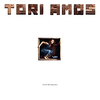 Atlantic
Atlantic
Alternative Rock, 1992





Ask anyone who endured the trials of adolescence and early adulthood in the 1990s, and chances are they’ll know at least one song from Tori Amos’s debut solo album Little Earthquakes. Chances are, that song is Silent All These Years, because if any track was designed to lull unsuspecting radio listeners into a false sense of security before sucker-punching them with emotional devastation, it’s this one.
At first listen, Silent All These Years is a delicate, piano-driven melody, the kind of thing you’d expect to accompany a sentimental ‘90s movie montage. But beneath the soothing exterior lies an intricate, boiling-over rage—the kind that simmers for years before exploding in an unholy symphony of shattered expectations. It’s a song about being ignored, underestimated, and silenced until, inevitably, one last heartbreak shoves you off the ledge. The bridge’s tonal shift is so breathtakingly perfect that listeners don’t just hear the song; they live it, soul-first, right into their gut. Congratulations! You are now emotionally wrecked. Please proceed.
If Silent All These Years is the polite warning shot, Precious Things is the full-scale assault. This track isn’t angry so much as wrath incarnate, the kind of song the Furies would belt out while tearing a wronged woman’s enemies limb from limb. Ms Amos snarls, “Let them bleed! Let them break!” with so much raw venom that you half expect your speakers to combust.
The title track Little Earthquakes is equally merciless, luring listeners in with its hypnotic melody before unleashing a banshee wail of “Disintegration, watching us wither!” that practically demands you sit in stunned silence for a moment afterward. If Kate Bush comparisons were inevitable for early Tori Amos, this song is where she made it clear: she wasn’t a clone, she was a hurricane of her own making.
Then there are China and Tear in Your Hand, obligatory ballads that sound like they were handcrafted for radio-friendly melancholia. Of course, this is Little Earthquakes, so even the most mainstream ballads come with a hefty side of soul-crushing sadness. China dissects a relationship slowly unraveling due to a communication breakdown, while Tear in Your Hand picks up the emotional shrapnel left behind when you realize you’ve been replaced by someone else—someone allegedly more complex, more interesting, and, presumably, less likely to cry-sing their way through this album at 2 AM.
Even when Ms Amos seems to lighten the mood, the darkness remains ever-present. Happy Phantom is a jaunty little number about, you know, gleefully planning one’s own demise. Leather masquerades as a sultry cabaret tune, but don’t let the playful melody fool you—it’s about degrading oneself to cling to the scraps of someone’s indifferent affection.
Yet, nothing—and I mean nothing—prepares you for Me and a Gun. An acapella track that chronicles Ms Amos’s real-life experience with sexual assault, the song is unsettling in the purest, most visceral way. There is no melody to soften the impact. No instrumental flourish to serve as a distraction. Just Ms Amos, her voice wavering between eerie calm and unbearable vulnerability. It is harrowing. It is gut-wrenching. And yet, you cannot turn away.
That is the genius of Little Earthquakes. It isn’t just an album; it’s an emotional endurance test. A 56-minute exorcism of anguish, rage, and trauma wrapped in deceptively pretty melodies. Ms Amos doesn’t just sing about pain; she forces you to confront it, live in it, and, if you make it through to the other side, maybe even come out feeling a little bit lighter.
It’s exhausting. It’s cathartic. It’s brilliant. And if you don’t need to lie down for a while after listening, congratulations—you might actually be made of stone.
